Login
Registration enables users to use special features of this website, such as past
order histories, retained contact details for faster checkout, review submissions, and special promotions.
order histories, retained contact details for faster checkout, review submissions, and special promotions.
Forgot password?
Registration enables users to use special features of this website, such as past
order histories, retained contact details for faster checkout, review submissions, and special promotions.
order histories, retained contact details for faster checkout, review submissions, and special promotions.
Quick Order
Products
Antibodies
ELISA and Assay Kits
Research Areas
Infectious Disease
Resources
Purchasing
Reference Material
Contact Us
Location
Corporate Headquarters
Vector Laboratories, Inc.
6737 Mowry Ave
Newark, CA 94560
United States
Telephone Numbers
Customer Service: (800) 227-6666 / (650) 697-3600
Contact Us
Additional Contact Details
Login
Registration enables users to use special features of this website, such as past
order histories, retained contact details for faster checkout, review submissions, and special promotions.
order histories, retained contact details for faster checkout, review submissions, and special promotions.
Forgot password?
Registration enables users to use special features of this website, such as past
order histories, retained contact details for faster checkout, review submissions, and special promotions.
order histories, retained contact details for faster checkout, review submissions, and special promotions.
Quick Order
Search Results for “caspase”
Pages with Related Content
Overview of all products associated with Caspase 4 + Caspase 5
CASP12 (Caspase 12) is an anti-inflammatory caspase that mediates apoptosis in response to endoplasmic reticulum stress in rodents. In humans, a majority of individuals have a premature stop codon in the CASP12 gene that results in a truncated and non-functional (but expressed) translated protein. Some individuals of primarily African descent have an alternate read-through codon that results in the translation of a functional CASP12 protein. These individuals have endotoxin hypo-responsiveness and an increased susceptibility to severe sepsis. CASP12 has also been found to be expressed in cancer, including multiple myeloma, gastrointestinal stromal tumors, glioblastoma and nasopharyngeal carcinoma cells. In immunohistochemistry, CASP12 has cytoplasmic (endoplasmic reticulum) positivity in the small intestine, heart, spleen, stomach, kidney, liver, lung, pancreas, thymus and testis.
References: Nature. 2004. 429 (6987): 75–9, PMID: 15129283; Proc. Natl. Acad. Sci. U.S.A. 106 (22): 9016–20, PMID: 19447924; Oncotarget. 2017 May 16; 8(20): 33515–33526, PMID: 28380444; Immunol Lett. 2016 May;173:21-5, PMID: 26973091
Overview of all products associated with CASP14 / Caspase 14
Viewing 1-3
of 34
site pages
for caspase
Products
☰ Filters
Products
Antibodies
(999+)
ELISA Kits
(266)
Proteins
(256)
Assay Kits
(1)
Type
Cell-Based
(9)
Cell-Based Phosphorylation
(10)
Competitive EIA
(7)
Custom
(22)
Detection/Quantition
(1)
Development Kit
(16)
Over-Expression Cell Culture Supernatant
(2)
Over-Expression Lysate
(93)
Primary
(999+)
Recombinant
(161)
Sandwich
(179)
Sandwich CLIA
(23)
Target
AIMP1 / EMAP II
(1)
AVEN / PDCD12
(32)
BAG1 / BAG-1
(2)
BCL10 / BCL-10
(8)
BCL2 / Bcl-2
(3)
BID
(1)
BIRC5 / Survivin
(3)
CAAP1
(3)
CARD10 / CARMA3
(27)
CARD14
(25)
CARD16 / COP
(30)
CARD17 / INCA
(13)
CARD18 / ICEBERG
(8)
CARD6
(30)
CARD8 / Cardinal / TUCAN
(31)
CARD9
(41)
CARMA1 / CARD11
(28)
CASP1 / Caspase 1
(160)
CASP10 / Caspase 10
(70)
CASP12 / Caspase 12
(76)
CASP13 / Caspase 13
(1)
CASP14 / Caspase 14
(113)
CASP2 / Caspase 2
(105)
CASP3 / Caspase 3
(299)
CASP4 / Caspase 4
(164)
CASP5 / Caspase 5
(54)
CASP6 / Caspase 6
(134)
CASP7 / Caspase 7
(157)
CASP8 / Caspase 8
(207)
CASP8AP2 / FLASH
(11)
CASP9 / Caspase 9
(204)
Caspase 3 Substrate
(3)
Caspase 4 + Caspase 5
(2)
CCM2 / Malcavernin
(1)
CD95 / FAS
(2)
CD99
(3)
CFLAR / FLIP
(100)
c-Kit / CD117
(1)
CYCS / Cytochrome c
(16)
DFFA / ICAD / DFF45
(1)
DFFB
(61)
DIABLO / SMAC
(1)
ESPL1 / Separase
(66)
FOXO4 / AFX1
(1)
MALT1
(66)
PARP1
(1)
RB1 / Retinoblastoma / RB
(2)
RFFL
(28)
Rho Kinase / ROCK1
(1)
RNF34
(31)
SPCS1
(11)
STRADB / ALS2CR2
(1)
TNFRSF1A / TNFR1
(1)
UACA
(4)
XAF1
(1)
Reactivity
Human
(999+)
Mouse
(798)
Rat
(530)
Bat
(8)
Bovine
(115)
Canine
(3)
Chicken
(15)
Chimpanzee
(37)
Cow
(64)
Dog
(53)
Drosophila
(7)
Gerbil
(16)
Gibbon
(46)
Guinea pig
(28)
Hamster
(26)
Horse
(32)
Monkey
(89)
Non-Human Primate
(1)
Orangutan
(10)
Pig
(42)
Porcine
(6)
Rabbit
(44)
Sheep
(16)
Xenopus
(2)
Yeast
(3)
Zebrafish
(3)
Application
IHC
(653)
IHC-Fr
(23)
IHC-P
(290)
WB
(999+)
Flo
(108)
DB
(27)
ELISA
(530)
ICC
(122)
IF
(244)
IP
(138)
Peptide-ELISA
(106)
Host
rabbit
(999+)
mouse
(295)
goat
(16)
rat
(22)
Product Group
DevKit DuoPlus
(16)
IHCPlus
(69)
PathPlus Cancer
(2)
PathPlus Neuro
(4)
Isotype
IgG
(859)
IgG1
(67)
IgG1,k
(64)
IgG2a
(32)
IgG2a,k
(24)
IgG2b
(8)
IgG2b,k
(38)
IgG3
(3)
IgG3,k
(1)
IgGa,k
(1)
IgM
(3)
Clonality
monoclonal mc
(313)
polyclonal pc
(999+)
Clone
02
(1)
10-1-62
(1)
10C6
(1)
11B4
(1)
11J26
(2)
1262CT521.280.101
(1)
12G6
(1)
14F4
(1)
14F468
(2)
14F7
(1)
154C1465
(1)
1-71
(1)
172C1094
(2)
18E809.3
(1)
1C10
(1)
1C11
(1)
1F3
(1)
1F9
(1)
1G12
(1)
1H11
(3)
20
(1)
2108C2a
(1)
25B881.1
(1)
2E3
(1)
2F12
(1)
2G12
(2)
31A1067
(1)
31A893
(1)
3-20
(1)
32051
(1)
36A349
(1)
3B10
(1)
3B8-4G2
(1)
3D2
(1)
3D4D10
(1)
3D4D7
(1)
3E8
(1)
3G4
(1)
3I3
(1)
415
(1)
4B8
(1)
4B9
(1)
4C1
(1)
4D10B2
(1)
4D3
(1)
4E11
(1)
4F7
(1)
4G2
(1)
4NMT-3
(3)
50
(1)
550CT8.5.2
(1)
5A2
(1)
5B4
(1)
5D3
(1)
5D8
(1)
5E1
(1)
5F7
(1)
5H10
(1)
6G11A6
(1)
6H2.B4
(2)
6H6
(1)
70A1426
(1)
7-1-11
(1)
7A3D12
(1)
7H8.2C12
(3)
7H8.2C12 + CYCS/1010
(3)
90A992
(2)
AE-5
(2)
ARBC2-1
(3)
BL10/411
(3)
B-R18
(2)
CDLA99
(3)
CTC05
(3)
CYCS/1010
(3)
G1/G1-4
(3)
MT1/410
(3)
MUBC10
(3)
NF6
(2)
OTI1B1
(2)
OTI1B12
(2)
OTI1E4
(2)
OTI2B9
(2)
OTI2D3
(2)
OTI2H3
(2)
OTI2H8
(2)
OTI3A2
(2)
OTI3E10
(2)
OTI4A2
(2)
OTI4C3
(2)
OTI4H10
(2)
OTI6C1
(2)
OTI6C11
(2)
OTI6D2
(2)
OTI9F6
(2)
SB71b
(2)
SPM389
(2)
SPM520
(2)
SPM578
(2)
UACA/1222
(2)
XJ11-1B12
(6)
Format
12 x 8-Well Microstrips
(22)
96-Well Microplate
(46)
96-Well Strip Plate
(182)
AF488 Conjugated
(1)
Antibody Pair and Standard
(16)
AP Conjugated
(1)
APC
(58)
APC Conjugated
(98)
Azide-free
(41)
Biotin Conjugated
(160)
BSA-free
(17)
Carrier-free
(16)
Concentrated
(3)
Cy3 Conjugated
(58)
Cy7 Conjugated
(58)
DY488 Conjugated
(2)
DY550 Conjugated
(2)
DY650 Conjugated
(1)
FITC Conjugated
(159)
HRP Conjugated
(153)
Magnetic beads Conjugated
(3)
PE Conjugated
(111)
Preservative Free
(8)
Ready-to-Use
(10)
Sepharose Conjugated
(3)
Unconjugated
(999+)
Epitope
C-Terminus
(56)
Internal
(46)
N-Terminus
(37)
aa29-175
(32)
aa81-270
(20)
aa81-179
(18)
aa1-200
(17)
aa120-297
(17)
aa119-296
(16)
aa194-293
(16)
aa207-303
(16)
aa24-198
(16)
aa25-175
(16)
aa290-377
(16)
aa183-277
(15)
aa1-272
(10)
aa331-416
(10)
aa7-216
(10)
aa1-242
(9)
aa161-210
(9)
pSer196
(9)
pSer257
(9)
pSer801
(9)
aa1-134
(8)
aa1-218
(8)
aa1-244
(8)
aa1-246
(8)
aa1-257
(8)
aa1-413
(8)
aa145-327
(8)
aa17-248
(8)
aa170-325
(8)
aa170-333
(8)
aa210-460
(8)
aa217-384
(8)
aa219-376
(8)
aa223-459
(8)
aa26-283
(8)
aa274-530
(8)
aa286-373
(8)
aa317-404
(8)
aa331-411
(8)
aa334-452
(8)
aa385-479
(8)
aa43-281
(8)
aa701-808
(8)
aa8-197
(8)
aa81-266
(8)
aa87-323
(8)
aa944-1148
(8)
pSer1126
(8)
aa1-30
(7)
aa149-179
(7)
aa165-193
(7)
aa17-45
(7)
aa235-263
(7)
aa265-294
(7)
aa283-311
(7)
aa37-65
(7)
aa518-546
(7)
aa78-106
(7)
pSer12
(7)
pSer26
(7)
aa198-226
(6)
aa301-350
(6)
pSer1176
(6)
pSer1501
(6)
pSer748
(6)
aa1-80
(5)
aa110-159
(5)
aa122-168
(5)
aa149-175
(5)
aa151-200
(5)
aa180-229
(5)
aa281-330
(5)
pSer150
(5)
pSer347
(5)
aa1-480
(4)
aa1-92
(4)
aa107-156
(4)
aa143-192
(4)
aa2-452
(4)
aa20-69
(4)
aa211-260
(4)
aa251-300
(4)
aa287-336
(4)
aa30-79
(4)
aa467-516
(4)
aa51-100
(4)
aa601-650
(4)
aa80-129
(4)
pSer376
(4)
pThr125
(4)
120-200 aa, Internal
(3)
90-170 aa
(3)
Cleaved-Asp175
(3)
N-Terminal
(3)
aa126-175
(3)
aa205-222
(3)
pTyr380
(3)
Publications
No
(999+)
Yes
(13)
Application
Spectrophotometry (fluorometric)
(1)
Equipment
Microplate fluorometer
(1)
Sample Type
Adherent Cell Cultures
(19)
Ascites
(1)
Cell Culture Supernatants
(31)
Cell Lysates
(45)
Cell Supernatant
(4)
Cerebrospinal Fluid
(1)
Plasma
(148)
Saliva
(1)
Serum
(152)
Tissue Homogenates
(93)
Urine
(1)
Tag
6His, C-terminus
(4)
6His, N-terminus
(10)
GST
(19)
GST, N-terminus
(30)
His
(30)
His, N-Terminal
(13)
His,N-terminus
(1)
His-GST
(4)
His-GST, N-terminus
(1)
His-S
(1)
His-SUMO
(2)
His-T7
(22)
His-T7, N-terminus
(1)
Myc-DDK (Flag)
(114)
Myc-DDK (Flag), C-terminus
(1)
TRX-6His, N-terminus
(1)
Species
Bovine
(5)
Human
(177)
Mouse
(18)
Pig
(1)
Rat
(10)
Source
293T Cells
(46)
E. coli
(88)
HEK 293 Cells
(73)
Wheat Germ Extract
(48)
Yeast
(1)
Purification
Purified
(31)
Low Endotoxin Level
Low endotoxin level
(6)
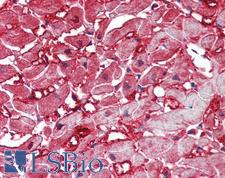
Neuroscience
CASP12 / Caspase 12 Rabbit anti-Human Polyclonal Antibody
Mouse, Rat, Human
ELISA, IF, IHC, IHC-P, WB
Unconjugated
0.05 mg/$440
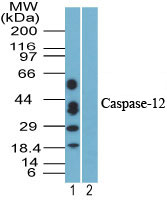
CASP12 / Caspase 12 Rabbit anti-Mouse Polyclonal (aa100-116) Antibody
Mouse
WB
Unconjugated
100 µg/$386
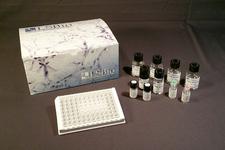
Sandwich
96-Well Strip Plate
Human
31.25 - 2000 pg/ml
Colorimetric - 450nm (TMB)
Plasma, Serum, Tissue Homogenates
1 Plate/$587
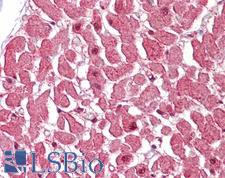
CASP12 / Caspase 12 Rabbit anti-Human Polyclonal Antibody
Mouse, Rat, Human
ELISA, IF, IHC, IHC-P, WB
Unconjugated
0.05 mg/$460
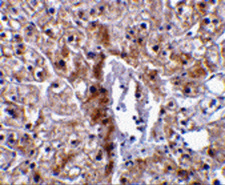
CASP12 / Caspase 12 Rabbit anti-Human Polyclonal Antibody
Mouse, Rat, Human
ELISA, IHC, WB
Unconjugated
0.1 mg/$460
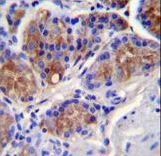
CASP12 / Caspase 12 Rabbit anti-Human Polyclonal (aa165-193) Antibody
Human
Flo, IF, IHC, IHC-P, WB
Unconjugated
400 µl/$393
CASP12 / Caspase 12 Rabbit anti-Human Polyclonal (aa165-193) Antibody
Human
ELISA, Flo, IF, IHC, WB
Unconjugated
200 µl/$734
CASP12 / Caspase 12 Rabbit anti-Human Polyclonal (aa165-193) (Biotin) Antibody
Human
ELISA, Flo, ICC, IF, IHC, WB
Biotin Conjugated
200 µl/$952
CASP12 / Caspase 12 Rabbit anti-Human Polyclonal (aa165-193) (FITC) Antibody
Human
ELISA, Flo, ICC, IF, IHC, WB
FITC Conjugated
200 µl/$952
CASP12 / Caspase 12 Rabbit anti-Human Polyclonal (aa165-193) (APC) Antibody
Human
ELISA, Flo, ICC, IF, IHC, WB
APC Conjugated
200 µl/$952
CASP12 / Caspase 12 Rabbit anti-Human Polyclonal (aa165-193) (Azide-free) (HRP) Antibody
Human
ELISA, Flo, ICC, IF, IHC, WB
HRP Conjugated, Azide-free
200 µl/$952
CASP12 / Caspase 12 Rabbit anti-Human Polyclonal (aa165-193) (PE) Antibody
Human
ELISA, Flo, ICC, IF, IHC, WB
PE Conjugated
200 µl/$952
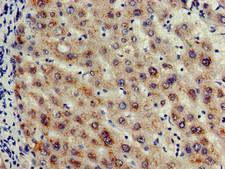
CASP12 / Caspase 12 Rabbit anti-Human Polyclonal Antibody
Mouse, Human
ELISA, IF, IHC, WB
Unconjugated
50 µg/$294; 100 µg/$360
CASP12 / Caspase 12 Rabbit anti-Human Polyclonal Antibody
Human
ELISA, IF, IHC, IP, WB
Unconjugated
100 µg/$331

CASP12 / Caspase 12 Rat Monoclonal (14F7) Antibody
Mouse, Rat, Human
ICC, IHC, IHC-P, IP, WB
Unconjugated
100 µg/$392

Sandwich
96-Well Strip Plate
Mouse
0.156 - 10 ng/ml
Colorimetric - 450nm (TMB)
Plasma, Serum
1 Plate/$669
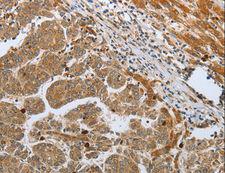
CASP12 / Caspase 12 Rabbit anti-Human Polyclonal Antibody
Mouse, Human
ELISA, IHC, WB
Unconjugated
20 µl/$254; 60 µl/$296; 120 µl/$355; 200 µl/$450
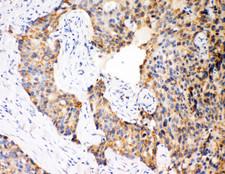
CASP12 / Caspase 12 Rabbit anti-Human Polyclonal (aa71-84) Antibody
Human
IHC, IHC-P, WB
Unconjugated
10 µg/$318; 100 µg/$470
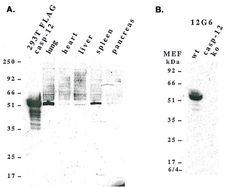
CASP12 / Caspase 12 Rat anti-Mouse Monoclonal (aa183-205) (12G6) Antibody
Mouse
ELISA, Flo, WB
Unconjugated
100 µg/$414
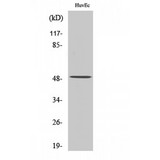
CASP12 / Caspase 12 Rabbit anti-Human Polyclonal (Internal) Antibody
Human
ELISA, IHC, WB
Unconjugated
50 µg/$295; 100 µg/$335; 200 µg/$394
CASP12 / Caspase 12 Rabbit anti-Mouse Polyclonal Antibody
Mouse, Rat, Human
IHC, WB
Unconjugated
100 µg/$649
CASP12 / Caspase 12 Rabbit anti-Mouse Polyclonal Antibody
Mouse, Rat, Human
IHC, WB
Unconjugated
100 µg/$649
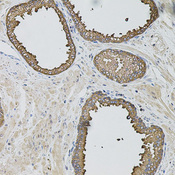
CASP12 / Caspase 12 Rabbit anti-Human Polyclonal Antibody
Mouse, Rat, Human
IHC, WB
Unconjugated
20 µl/$275; 100 µl/$389
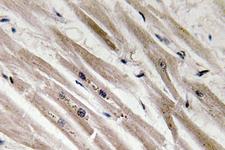
CASP12 / Caspase 12 Rabbit anti-Human Polyclonal (aa50-99) Antibody
Human
IHC, Peptide-ELISA, WB
Unconjugated
50 µl/$334; 100 µl/$397
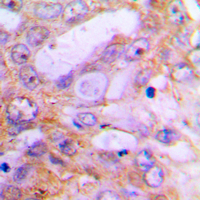
CASP12 / Caspase 12 Rabbit anti-Human Polyclonal (Internal) Antibody
Human
IHC, IHC-P, WB
Unconjugated
100 µl/$299
Viewing 1-25
of 2446
product results
for caspase











